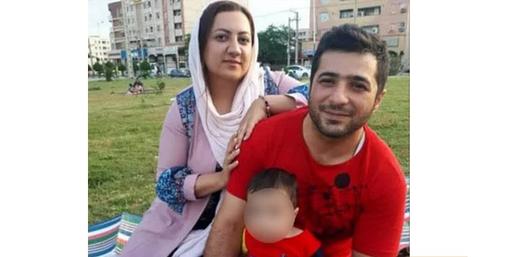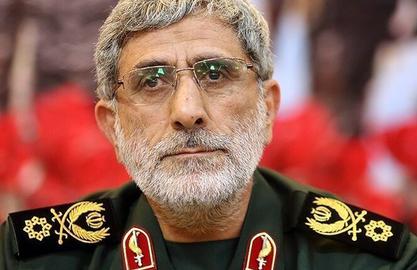This weekend Iranian media reported extensively on the killing of a young mother in Ahvaz at the hands of local police. Sanaz Mohammadian was just 34 years old and reportedly died in hospital just over a month ago, after officers opened fire on the family car at a busy interchange in the Khuzestani capital.
On Sunday, the day after the news broke, police issued a statement claiming the car had been pursued because it looked similar to one being driven by the group of thieves. The force claimed to have fired shots into the air first in a bid to stop the car; Sanaz’s devastated husband, Milad Mohammadian, does not recall the occupants of the three police cars that tailed them doing any such thing. Officers then shot directly at the car at close range.
"At 11 o'clock in the morning on Friday, October 1,” the statement read, “police were immediately dispatched following an armed robbery of gold from a woman in the 23rd Ahvaz police district by the occupants of a white Peugeot Pars with blacked-out windows. While investigating... there was a call from the Police Emergency Center stating that another armed robbery had been carried out in the Mahdis area by the occupants of the Peugeot Pars.
“Police were deployed [to Mahdis]. They saw a white Peugeot Pars with tinted windows that resembled the thieves' car, whose driver pulled away as soon as he saw the police patrol. Officers sounded the sirens and warned the driver to stop, but unfortunately, the driver did not heed the police warning."
Police did not admit to any error of judgment in their version of events, but bluntly stated: "The investigation revealed that a woman in the back seat, who was the driver's wife, was unfortunately shot and sent to hospital, and unfortunately died after a few days in a coma. Expressing our regret and sympathy with the family of the deceased, we hereby announce that the situation is under investigation and the results will be announced later."
Not only has no apology been extended to the family, but according to Milad’s lawyer, some officers even tried to deny the incident had taken place. It wasn’t until Saturday, November 6 that ILNA news agency published any information about the case, after reportedly exhaustive follow-ups with provincial and national police.
Milad Mohammadian told ISNA the couple’s young child had been sat in the front seat at the time of the shooting. “The police came up behind us on Abfa Boulevard. I
saw the Roniz [a make of SUV] in the mirror, moving at a speed of 50 to 60km an hour. When I reached the first intersection, the L90, Pars [car brands] and Roniz stopped behind me. The boulevard was a bit crowded and I slowed down to wait for it to get less congested. There are crossings all the way down the center of Abfa Boulevard; you can’t move fast at all."
Milad made no mention of having heard a siren, nor of shots being fired by officers in a bid to stop the car. "I got to the crossing to stop and wait. Then the police’s Roniz got there; an officer got out, took a Kalashnikov from his soldier and without any warning, fired at the rear window of our car from 70 to 80 centimeters away.”
In the aftermath, once officers recognized the grave mistake they had made, Sanaz was taken to Taleghani Hospital in Ahvaz in a police car. The officers left not five minutes later, Milad said. After resuscitation, Sanaz was taken to Golestan Hospital in a coma. But she died 48 hours later.
Milad Mohammadian's lawyer, Pedram Manjezi, told ISNA that the two robbers described by the police in their statement were still at large. He added: "Immediately after learning of the matter, I went to the police station to follow up on the incident. Conversations with the officers indicated they’d said that there was no pursuit by the police, and no siren was used." He also criticized the station’s failure to appoint anyone to investigate the case in the military courts, which oversee police matters, 21 days after the death.
Weakness in the Law
Both before and after the 1994 implementation of Iran’s law on the emergency use of weapons by the armed forces, dozens of citizens have been killed every year by police, Basij members and other officers either accidentally or wrongly discharging their weapons on the streets. Why does this keep happening?
Musa Barzin Khalifehlou, a legal consultant to IranWire, observes: "Most cases of citizens killed by law enforcement seem to be closed through the payment of a blood money [to the victim’s family], or else the investigation process is never completed at all.
“If it’s found to have been premeditated or quasi-premeditated murder, the court must decide on the appropriate form of retribution [qisas] or imprisonment. The law on the use of weapons by the armed forces also states that if a killing is not premeditated and the officer has obeyed the law – if the killing was unintentional – police must pay compensation."
No exact figures have been released on the number of civilians killed by Iranian police by mistake each year. The only official statistics available in the past covered the amount of blood money paid in connection with fatal shootings: a total of six billion tomans in 2016. In 2015 and 2016, according to police data, a grand total of 150 people died after being shot by police in Iran intentionally and unintentionally. But even this figure only covered those whose cases had been examined by a court and closed, and since 2016, police have issued no information on the subject at all.
Some Iranian populations are especially at risk due to entrenched discrimination and confusion around the law. Every year news of the killing of Baluch fuel carriers makes the news, but no-one is ever reported to have been put on trial as a consequence. Khalifehlou believes this is a “systematic” process: “The pretext for these attacks is the fight against smuggling. But in the central regions, officers are more unskilled in using weapons, and the cases are closed through payment of the blood money so that the police’s authority is not questioned."
In June 1995, the Supreme Court ruled that police officers should be exempted from retribution [qisas] if a fatal shooting was “not intentional”. On a scattered few occasions, though, officers have faced criminal reprisal through qisas for shootings. In 2007, after years of investigation, the court sentenced an officer to retributive justice for killing a citizen in Bushehr. Six more officers were sentenced to the same over an incident in Razavi Khorasan that claimed three lives in 2018.
Related coverage:
'Courts Blamed My 15-Year-Old Son for Being Shot Dead in November 2019'
Shooting of Civilians in Khuzestan Raised at the UN
Iranian Police Study: Shame Officers Who Take Bribes on TV
How Did the Fires of Protest in Saravan Ignite?
The Police Reports That Predicted Unrest in Sistan and Baluchistan
visit the accountability section
In this section of Iran Wire, you can contact the officials and launch your campaign for various problems

























comments